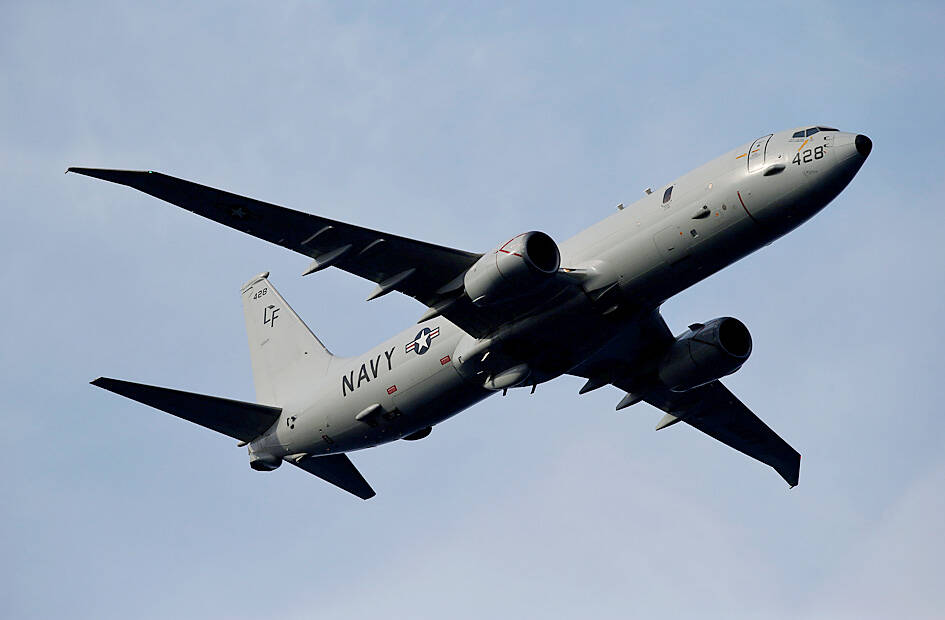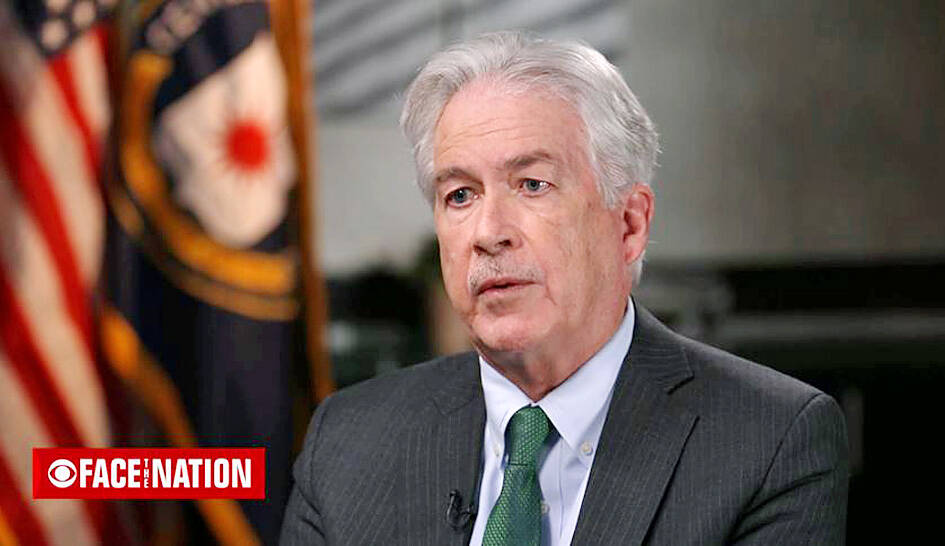A US naval aircraft yesterday made a rare transit through the Taiwan Strait, a flight the US Navy said showed Washington’s “commitment to a free and open Indo-Pacific” region.
The US Navy P-8A Poseidon transited the Taiwan Strait in international airspace, according to a statement released by the 7th Fleet of the US Pacific Command.
“By operating within the Taiwan Strait in accordance with international law, the United States upholds the navigational rights and freedoms of all nations,” the statement said. “The aircraft’s transit of the Taiwan Strait demonstrates the United States’ commitment to a free and open Indo-Pacific.”

Photo: Reuters
In Taipei, the Ministry of National Defense also confirmed the aircraft’s passage, saying in a statement that the military was on top of the situation as a US military aircraft flew northward in the Taiwan Strait yesterday and that it did not see anything out of the ordinary.
US warships have been making routine, almost monthly, passages through the waterway separating Taiwan and China over the past three years as tensions across the Taiwan Strait have escalated, but it is rare for a US warplane to do so.
The last time a US warplane, also a US Navy P-8A Poseidon, flew over the waterway was on June 24 last year, a day after China sent 29 planes into Taiwan’s air defense identification zone — at that point the third-highest daily number since the start of last year.

Photo: screen grab from CBS News
The Boeing P-8 Poseidon is a US maritime patrol and reconnaissance aircraft developed and derived from the civilian Boeing 737-800.
The P-8 Poseidon operates in anti-submarine warfare, anti-surface warfare and intelligence, surveillance and reconnaissance roles.
China yesterday accused the US of “endangering” peace and stability in the Taiwan Strait.
The Eastern Theater Command of the People’s Liberation Army (PLA) said its forces closely monitored the aircraft.
“The US side’s actions deliberately interfered with and disrupted the regional situation and endangered peace and stability in the Taiwan Strait. We firmly oppose this,” it said in a statement.
Meanwhile, CIA Director William Burns said that US intelligence shows that Chinese President Xi Jinping (習近平) has instructed his nation’s military to “be ready by 2027” to invade Taiwan, though he might be harboring doubts about his ability to do so given Russia’s experience in its invasion of Ukraine.
Burns, in a television interview that aired on Sunday, said that the US must take “very seriously” Xi’s desire to ultimately control Taiwan, even if military conflict is not inevitable.
“We do know, as has been made public, that President Xi has instructed the PLA, the Chinese military leadership, to be ready by 2027 to invade Taiwan, but that doesn’t mean that he’s decided to invade in 2027 or any other year as well,” Burns told CBS’ Face the Nation.
“I think our judgement at least is that President Xi and his military leadership have doubts today about whether they could accomplish that invasion,” he said.
Burns said the support from the US and European allies for Ukraine following Russian President Vladimir Putin’s invasion of that nation could be acting as a potential deterrent to Chinese officials, but said the risks of a possible attack on Taiwan would only grow.
“I think, as they’ve looked at Putin’s experience in Ukraine, that’s probably reinforced some of those doubts,” Burns said. “So, all I would say is that I think the risks of, you know, a potential use of force probably grow the further into this decade you get and beyond it, into the following decade as well. So that’s something, obviously, that we watch very, very carefully.”
Additional reporting by Reuters

NATIONAL SECURITY THREAT: An official said that Guan Guan’s comments had gone beyond the threshold of free speech, as she advocated for the destruction of the ROC China-born media influencer Guan Guan’s (關關) residency permit has been revoked for repeatedly posting pro-China content that threatens national security, the National Immigration Agency said yesterday. Guan Guan has said many controversial things in her videos posted to Douyin (抖音), including “the red flag will soon be painted all over Taiwan” and “Taiwan is an inseparable part of China,” while expressing hope for expedited “reunification.” The agency received multiple reports alleging that Guan Guan had advocated for armed reunification last year. After investigating, the agency last month issued a notice requiring her to appear and account for her actions. Guan Guan appeared as required,

DAREDEVIL: Honnold said it had always been a dream of his to climb Taipei 101, while a Netflix producer said the skyscraper was ‘a real icon of this country’ US climber Alex Honnold yesterday took on Taiwan’s tallest building, becoming the first person to scale Taipei 101 without a rope, harness or safety net. Hundreds of spectators gathered at the base of the 101-story skyscraper to watch Honnold, 40, embark on his daredevil feat, which was also broadcast live on Netflix. Dressed in a red T-shirt and yellow custom-made climbing shoes, Honnold swiftly moved up the southeast face of the glass and steel building. At one point, he stepped onto a platform midway up to wave down at fans and onlookers who were taking photos. People watching from inside

A Vietnamese migrant worker yesterday won NT$12 million (US$379,627) on a Lunar New Year scratch card in Kaohsiung as part of Taiwan Lottery Co’s (台灣彩券) “NT$12 Million Grand Fortune” (1200萬大吉利) game. The man was the first top-prize winner of the new game launched on Jan. 6 to mark the Lunar New Year. Three Vietnamese migrant workers visited a Taiwan Lottery shop on Xinyue Street in Kaohsiung’s Gangshan District (崗山), a store representative said. The player bought multiple tickets and, after winning nothing, held the final lottery ticket in one hand and rubbed the store’s statue of the Maitreya Buddha’s belly with the other,

‘NATO-PLUS’: ‘Our strategic partners in the Indo-Pacific are facing increasing aggression by the Chinese Communist Party,’ US Representative Rob Wittman said The US House of Representatives on Monday released its version of the Consolidated Appropriations Act, which includes US$1.15 billion to support security cooperation with Taiwan. The omnibus act, covering US$1.2 trillion of spending, allocates US$1 billion for the Taiwan Security Cooperation Initiative, as well as US$150 million for the replacement of defense articles and reimbursement of defense services provided to Taiwan. The fund allocations were based on the US National Defense Authorization Act for fiscal 2026 that was passed by the US Congress last month and authorized up to US$1 billion to the US Defense Security Cooperation Agency in support of the